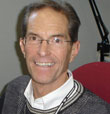
John Pihl
John Pihl has been named UCSF's first sustainability manager, a new position within Capital Programs & Facilities Management (CPFM), which is directed by Associate Vice Chancellor Steve Wiesenthal.
Prior to joining the University in October, Pihl worked for Kaiser Permanente, the David and Lucile Packard Foundation, and Hewlett-Packard in various positions related to environmental sustainability. Pihl is a licensed architect and an accredited professional in Leadership in Energy and Environmental Design.
Pihl's arrival at UCSF is a sign of the times. UCSF, the University of California, the nation and the world have been focusing more attention on the health of Earth. The need to intervene to protect the planet from further destruction has been well publicized through news media and films, including the Academy Award-winning documentary An Inconvenient Truth by former US Vice President Al Gore.
On Monday, Gore used the occasion of his 2007 Nobel Peace Prize lecture in Oslo, Norway, to say that global warming is a "real, rising, imminent and universal" threat to the future of the Earth, according to the
New York Times.
The University of California is committed to reducing the University's impact on the environment and reducing the University's dependence on nonrenewable energy. In March 2007, the UC Sustainability Steering Committee reviewed and revised UC's policies on sustainable practices. The newly added sections expand on UC's general guidelines for building renovations, climate protection, sustainable operations, recycling and waste management, and environmentally preferable procurement of supplies and equipment. UC's Policy on Sustainable Practices is posted online as a PDF
here.
At UCSF, work toward a sustainable campus life that protects and enhances the environment and health of the staff and students, as well as the City of San Francisco has been led by the UCSF Environmental Sustainability Committee, which is chaired by Wiesenthal. Pihl has joined the committee.
UCSF has made significant accomplishments recently to further a sustainable environment. Campus energy savings in fiscal year 2006-2007 alone were 33 billion BTUs - enough to power more than 500 homes for a year. Translated to a dollar amount, that's $600,000 in savings. Energy-efficient systems saved 1,600 tons of greenhouse gas emissions at UCSF last year.
Other accomplishments include:
* A 26 percent increase in recycling rates from 1999 to 2006
* A savings of 800,000 gallons of water per year through installation of 20 waterless urinals
* An increase in ridesharing from 30 vanpools in 2001 to 58 vanpools in 2007.
UCSF CPFM writer Colleen Hubbard posed these questions to Pihl recently.
Q: When did you first become interested in sustainability?
A: In architecture school, I was asked to design a zoo. I realized that the environments traditionally designed for animals were not right for them, and it occurred to me that the environments traditionally designed for people are not right for us, either. Later I worked for Romaldo Giurgola, an architect in Philadelphia, who believed that a building should respond to its environment. I learned a great deal from his design philosophy.
Q: How do you see your role here?
A: My role is to act as a resource and to assist in creating innovative processes that make us more sustainable. As sustainability manager, I'll develop and manage sustainability initiatives and educate people about sustainability.
Q: What are you most excited about when you consider sustainability at UCSF?
A: The potential benefit to students, faculty, staff, patients and the community.
Q: If we implement some of the programs you are considering, how will UCSF look different in 10 years?
A: It shouldn't look different, it should be different. We'll breathe cleaner air, see the outdoors from our work environments and use new technologies to generate cleaner energy.
Q: What is one thing someone can do right now to contribute to the sustainability effort?
A: There is so much. Mostly, I suggest that you be open to subtle lifestyle changes. For example, wear seasonably appropriate clothing so we don't have to use so much energy heating and cooling our environments. Even a two degree change in your thermostat can be significant.
UCSF Today Editor Lisa Cisneros contributed to this report.
Editor's note: The UCSF Environmental Sustainability Committee is always looking for people who are committed to responsible stewardship of environmental resources. More information about the committee is posted online here.
Related Link:
Climate of Change, UC Office of the President

